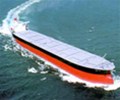Vitol exec sees China as main buyer for dirty Russian oil cargoes

Oil traders and refiners with cargoes of contaminated Russian oil may be forced to find buyers for the unwanted shipments in China or Japan where the corrosive crude can be blended with large volumes of government-controlled strategic crude stocks, Vitol director Mike Muller said.
Around 15 million barrels of Urals crude contaminated with organic chloride were loaded into tankers from Russia’s Baltic Sea port of Ust-Luga around the end of April and early May, according to market sources, with independent oil traders such as Vitol and Glencore among the key buyers. Levels of organic chlorides in the Urals stream at Ust-Luga jumped to more than 60 ppm at the height of the contamination in some cases, from normal levels of less than 5 ppm.
Vitol, the world’s biggest independent oil trader, was one of the top three buyers of the contaminated crude in terms of volumes and it lifted more than one cargo of Urals from the affected port, Muller said.
“We have various challenges, one of them is how do you pass the losses on to the supplier and the other is how do you sell it,” Muller told S&P Global Platts on the sidelines of an industry event in London.
Efforts to sell the affected tanker cargoes to European refiners have been frustrated by the fact that few have discretionary storage capacity to blend the oil with normal quality crude, he said. The current backwardated structure of the oil price curve also offers refiners no incentive to store oil in the hope of selling it for a profit in the future. Charges for storage costs, tied up working capital and potential damage to refineries or infrastructure also makes the sale to regional refiners unattractive, he said.
“All you can think of is these big, vast tanker farms that the Chinese built, maybe the Japanese, where you have obligatory stocks and you’ve got to tap into the government agencies running those SPR’s (strategic petroleum reserves)…it’s the only way you can do it,” Muller said.
If agreed, the contaminated crude can then be “trickled” into the existing stocks to keep the resulting blend at below safe levels of organic chlorides, he said.
Muller, the former head of crude trading at Shell, declined to comment on a recent report by Reuters that Vitol had sold one of its contaminated Urals cargoes to Chinese independent refiner Bora Group.
According to the Russian energy ministry, Urals flows to Ust-Luga returned to normal on May 9 but lingering concerns over the reliability of crude quality from the port have supported premiums for cargoes of Urals from Primorsk over Ust-Luga loadings.
Source: Platts

 Hellenic Shipping News Worldwide Hellenic Shipping News Worldwide, Online Daily Newspaper on Hellenic and International Shipping
Hellenic Shipping News Worldwide Hellenic Shipping News Worldwide, Online Daily Newspaper on Hellenic and International Shipping





















 PG-Software
PG-Software